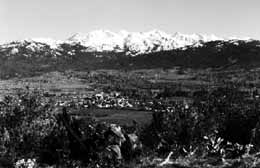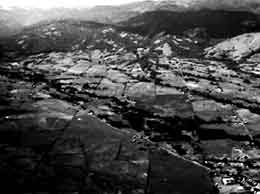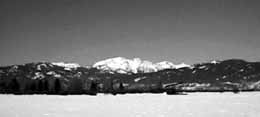
 "We
wanted to get on the map, and we said 'Why don't we just try to get
on the map?'" (Kopelman) Traditionally the citizens of Hallfway, Oregon
are used to a gold-rush mentality. The little town was founded in
the 1800s at a spot near the Idaho line midway between the towns Cornucopia
and Sparta, hence Halfway's name. In this time the town was known
as a way station for travelers to water their horses between the two
nearby gold-rush towns. Today the town (pop. 345), is a picturesque
community located 40 miles southwest of Hells Canyon in Eastern Oregon.
Consisting of hard- working, self-sufficient folks, the town is tight-knit
community, full of tradition and camaraderie. Located in scenic Pine
Valley, visitors will find a variety of outdoor activities in any
season, including backpacking, llama excursions, snowmobiling, cross-country
skiing, fishing, hunting, wild river rafting, and more. Surrounded
by snow-covered mountains and streams, Halfway might seem like paradise.
But the boom-and-bust cycles of Western industry have ravaged Halfway's
economy. The town relies heavily on tourism for its business. These
days, it's mostly a destination for outdoor enthusiasts. City Planner
Patti Huff sums up the situation: "Logging's gone, dairy and mining's
gone, ranching's gone. It's hurt us." The idea to ask Halfway to change
its name came in the midst of a brainstorming session among half.com's
marketing staff. "It's a great opportunity for both sides," said Joshua
Kopelman, CEO of half.com, a Philadelphia-based internet company which
is providing a person-to-person e-commerce site on the net. "We want
to boost their tourism (and) we get a level of attention and publicity
and recognition as 'out-of-the-box' thinkers." "We wanted to get on
the map, and we said 'Why don't we just try to get on the map?'" Kopelman
said. "We went on the Web and looked up every town with the word 'Half'
in it." After brief searches on Yahoo and Mapquest.com, the team whittled
off towns unlikely to participate, such as Half Moon Bay,
"We
wanted to get on the map, and we said 'Why don't we just try to get
on the map?'" (Kopelman) Traditionally the citizens of Hallfway, Oregon
are used to a gold-rush mentality. The little town was founded in
the 1800s at a spot near the Idaho line midway between the towns Cornucopia
and Sparta, hence Halfway's name. In this time the town was known
as a way station for travelers to water their horses between the two
nearby gold-rush towns. Today the town (pop. 345), is a picturesque
community located 40 miles southwest of Hells Canyon in Eastern Oregon.
Consisting of hard- working, self-sufficient folks, the town is tight-knit
community, full of tradition and camaraderie. Located in scenic Pine
Valley, visitors will find a variety of outdoor activities in any
season, including backpacking, llama excursions, snowmobiling, cross-country
skiing, fishing, hunting, wild river rafting, and more. Surrounded
by snow-covered mountains and streams, Halfway might seem like paradise.
But the boom-and-bust cycles of Western industry have ravaged Halfway's
economy. The town relies heavily on tourism for its business. These
days, it's mostly a destination for outdoor enthusiasts. City Planner
Patti Huff sums up the situation: "Logging's gone, dairy and mining's
gone, ranching's gone. It's hurt us." The idea to ask Halfway to change
its name came in the midst of a brainstorming session among half.com's
marketing staff. "It's a great opportunity for both sides," said Joshua
Kopelman, CEO of half.com, a Philadelphia-based internet company which
is providing a person-to-person e-commerce site on the net. "We want
to boost their tourism (and) we get a level of attention and publicity
and recognition as 'out-of-the-box' thinkers." "We wanted to get on
the map, and we said 'Why don't we just try to get on the map?'" Kopelman
said. "We went on the Web and looked up every town with the word 'Half'
in it." After brief searches on Yahoo and Mapquest.com, the team whittled
off towns unlikely to participate, such as Half Moon Bay,  California,
and eventually settled on Halfway, Oregon. Halfway seemed a perfect
match for Half.com, Kopelman said, given its rural landscape and small
population (360). "It's the folksy, warm nature there," he said. "They
have llama rides." To add to the kismet, Halfway's global positioning
fit perfectly into Half.com's marketing scheme. "They're within four
miles of the 45th parallel which makes it halfway between the equator
and the North Pole," Kopelman said, excitedly. With an economic history
marked by booms and busts in logging, mining, and ranching, Halfway
was ready for a new, forward-looking gig when Half.com came along.
"They were looking for a way to avoid being left behind," Kopelman
said. So when Joshua Kopelman, the 28-year-old Philadelphia entrepreneur,
rang up, the town listened. Mr. Kopelman, describing his venture Ð
half.com Ð as an alternative to online auctions, saw the name change
as a way to get his web site on the map. In exchange, half.com would
help bolster the town's economy, possibly subsidizing Internet access
for citizens. In early December 1999, a representative of the half.com
marketing team paid a visit to Halfway, Oregon to ask Mayor Dick Crow
if the town would consider changing its name to Half.com, Oregon.
Although skeptical at first, Mayor Crow conducted in some preliminary
discussions with half.com and decided to direct the matter to the
City Council for further consideration. At the next scheduled City
Council meeting, half.com proposed a tentative agreement that would
provide financial support for civic endeavors. The City Council voted
to proceed in discussions with half.com after the 1999 holiday season.
Shortly after this vote, the media learned of the proceedings and
national press exploded. CNN, the Wall Street Journal, USA Today,
Good Morning America, NY Times, and dozens of other news outlets carried
the story of how Half.com, Oregon, might become the first dot com
city in the world. In January 2000, the Oregon marketing team returned
to Halfway to gather feedback from the citizens of the town and determine
how a partnership could work best. After talking with dozens of town
California,
and eventually settled on Halfway, Oregon. Halfway seemed a perfect
match for Half.com, Kopelman said, given its rural landscape and small
population (360). "It's the folksy, warm nature there," he said. "They
have llama rides." To add to the kismet, Halfway's global positioning
fit perfectly into Half.com's marketing scheme. "They're within four
miles of the 45th parallel which makes it halfway between the equator
and the North Pole," Kopelman said, excitedly. With an economic history
marked by booms and busts in logging, mining, and ranching, Halfway
was ready for a new, forward-looking gig when Half.com came along.
"They were looking for a way to avoid being left behind," Kopelman
said. So when Joshua Kopelman, the 28-year-old Philadelphia entrepreneur,
rang up, the town listened. Mr. Kopelman, describing his venture Ð
half.com Ð as an alternative to online auctions, saw the name change
as a way to get his web site on the map. In exchange, half.com would
help bolster the town's economy, possibly subsidizing Internet access
for citizens. In early December 1999, a representative of the half.com
marketing team paid a visit to Halfway, Oregon to ask Mayor Dick Crow
if the town would consider changing its name to Half.com, Oregon.
Although skeptical at first, Mayor Crow conducted in some preliminary
discussions with half.com and decided to direct the matter to the
City Council for further consideration. At the next scheduled City
Council meeting, half.com proposed a tentative agreement that would
provide financial support for civic endeavors. The City Council voted
to proceed in discussions with half.com after the 1999 holiday season.
Shortly after this vote, the media learned of the proceedings and
national press exploded. CNN, the Wall Street Journal, USA Today,
Good Morning America, NY Times, and dozens of other news outlets carried
the story of how Half.com, Oregon, might become the first dot com
city in the world. In January 2000, the Oregon marketing team returned
to Halfway to gather feedback from the citizens of the town and determine
how a partnership could work best. After talking with dozens of town
 residents,
half.com proposed to donate 20 computers to the city for use in the
computer lab at Halfway Elementary School; a prize to be raffled at
the County Fair; and funds to be used in civic improvement efforts.
In exchange, the town agreed to issue a proclamation changing its
name to HALF.COM, Oregon. At the last council meeting 95 residents
were in favour of the change with only three opposed. Those against
the idea believe it creates the impression that the town is struggling
to survive when the opposite is true. "To justify the plan, people
have been saying we're a dying town, which is not the case," said
David Baker, the book-keeper at the local Hells Canyon Journal. Now,
in an effort to cash in on the 1990s' gold rush, the town became America's
first dot-com city. For the year 2000, Halfway is reborn under a new
name: Half.com. On Wednesday, January 19th, NBC's Today Show was broadcast
live from Half.com, Oregon, and Conshohocken, Pennsylvania, corporate
headquarters of half.com, Inc. as the company launched its web site.
Millions of viewers and Internet users throughout the country and
the world experienced the proclamation of the World's First Dot Com
City and the new person-to-person business model presented by half.com.
"The agreement is a real win-win as we really believe our affiliation
with Halfway will positively impact the community's economy," said
company founder Joshua Kopelman. For the price of $75000 and 22 computers
the town is renamed to Half.com for the duration of the year 2000.
The startup company, which bills itself as a one-on-one Internet auction
site, hopes the one-year stunt will generate publicity worth much
more. The new name won't show up on any map, but the company wants
to post a sign on the main road into town that would read: "Welcome
to the first dot-com city in America, Half.com - aka Halfway, Oregon."
Halfway isn't the first town to take on an unusual namesake in the
hopes of generating economic and tourist buzz. In 1993, the town of
Ismay, Montana (pop. 22) briefly changed its name to Joe, Montana,
in honor of the NFL quarterback. In 1950, Hot Springs, New Mexico
voted to change its name to Truth or Consequences; the famed radio
program of the same name had offered to host an annual celebration
and a nationwide broadcast from any town that offered to change its
name. Since then, the town has voted at least twice to keep the name.
residents,
half.com proposed to donate 20 computers to the city for use in the
computer lab at Halfway Elementary School; a prize to be raffled at
the County Fair; and funds to be used in civic improvement efforts.
In exchange, the town agreed to issue a proclamation changing its
name to HALF.COM, Oregon. At the last council meeting 95 residents
were in favour of the change with only three opposed. Those against
the idea believe it creates the impression that the town is struggling
to survive when the opposite is true. "To justify the plan, people
have been saying we're a dying town, which is not the case," said
David Baker, the book-keeper at the local Hells Canyon Journal. Now,
in an effort to cash in on the 1990s' gold rush, the town became America's
first dot-com city. For the year 2000, Halfway is reborn under a new
name: Half.com. On Wednesday, January 19th, NBC's Today Show was broadcast
live from Half.com, Oregon, and Conshohocken, Pennsylvania, corporate
headquarters of half.com, Inc. as the company launched its web site.
Millions of viewers and Internet users throughout the country and
the world experienced the proclamation of the World's First Dot Com
City and the new person-to-person business model presented by half.com.
"The agreement is a real win-win as we really believe our affiliation
with Halfway will positively impact the community's economy," said
company founder Joshua Kopelman. For the price of $75000 and 22 computers
the town is renamed to Half.com for the duration of the year 2000.
The startup company, which bills itself as a one-on-one Internet auction
site, hopes the one-year stunt will generate publicity worth much
more. The new name won't show up on any map, but the company wants
to post a sign on the main road into town that would read: "Welcome
to the first dot-com city in America, Half.com - aka Halfway, Oregon."
Halfway isn't the first town to take on an unusual namesake in the
hopes of generating economic and tourist buzz. In 1993, the town of
Ismay, Montana (pop. 22) briefly changed its name to Joe, Montana,
in honor of the NFL quarterback. In 1950, Hot Springs, New Mexico
voted to change its name to Truth or Consequences; the famed radio
program of the same name had offered to host an annual celebration
and a nationwide broadcast from any town that offered to change its
name. Since then, the town has voted at least twice to keep the name.